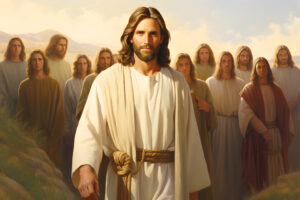Posted by Roberta Grimes • December 14, 2024 • 5 Comments
Jesus
O come, O come, Emmanuel,
And ransom captive Israel,
That mourns in lonely exile here,
Until the Son of God appear.
Rejoice! Rejoice! Emmanuel
Shall come to thee, O Israel.
O come, Thou Rod of Jesse, free
Thine own from Satan’s tyranny;
From depths of hell Thy people save,
And give them victory o’er the grave.
Rejoice! Rejoice! Emmanuel
Shall come to thee, O Israel.
O come, Thou Dayspring, from on high,
And cheer us by Thy drawing nigh;
Disperse the gloomy clouds of night,
And death’s dark shadows put to flight.
Rejoice! Rejoice! Emmanuel
Shall come to thee, O Israel.
– John Mason Neale (1818-1866), Translator, from “Oh Come, Oh Come, Emmanuel” (15th Cen CE)
 I had almost no time to blog this week because I have just returned from a trip to Massachusetts to see my beloved legal clients, so I still had things to do for them. I turned to Thomas early on Friday morning, and I said, “I got nothin’. So it’s your turn!” He said to me calmly, “Let’s write about what most people are wondering about now, twelve days before Christmas. Why did Jesus come to the world when He did? Why then? Why not a thousand years earlier? Or two thousand years later? And why in Bethlehem of Judea, of all places?” I said right back to Thomas, “Hey, great idea! And will Jesus sit with us so we can interview Him, do you think? Give us some of His own insights?”
I had almost no time to blog this week because I have just returned from a trip to Massachusetts to see my beloved legal clients, so I still had things to do for them. I turned to Thomas early on Friday morning, and I said, “I got nothin’. So it’s your turn!” He said to me calmly, “Let’s write about what most people are wondering about now, twelve days before Christmas. Why did Jesus come to the world when He did? Why then? Why not a thousand years earlier? Or two thousand years later? And why in Bethlehem of Judea, of all places?” I said right back to Thomas, “Hey, great idea! And will Jesus sit with us so we can interview Him, do you think? Give us some of His own insights?”
 I immediately got what I have come to think of as my spirit guide’s Fu Manchu frown. He showed himself to me in a flash as a sixth-level being, nine feet tall and thin, with a fancy robe and frowning behind a long Fu Manchu mustache. So, of course I did next what you would do. I Googled, “Why did Jesus choose to be born where and when He was born?” And I received this pretty good, if superficial, answer:
I immediately got what I have come to think of as my spirit guide’s Fu Manchu frown. He showed himself to me in a flash as a sixth-level being, nine feet tall and thin, with a fancy robe and frowning behind a long Fu Manchu mustache. So, of course I did next what you would do. I Googled, “Why did Jesus choose to be born where and when He was born?” And I received this pretty good, if superficial, answer:
 “According to Christian belief, Jesus was born in Bethlehem, during the reign of King Herod the Great, because this fulfilled Old Testament prophecies that the Messiah would be born in Bethlehem, and the timing coincided with a period of relative peace under Roman rule known as the Pax Romana, which allowed for the spread of his message across the Roman Empire; however, the exact date of Jesus’s birth is not definitively known, and is estimated to be between 6 and 4 BC based on historical context.”
“According to Christian belief, Jesus was born in Bethlehem, during the reign of King Herod the Great, because this fulfilled Old Testament prophecies that the Messiah would be born in Bethlehem, and the timing coincided with a period of relative peace under Roman rule known as the Pax Romana, which allowed for the spread of his message across the Roman Empire; however, the exact date of Jesus’s birth is not definitively known, and is estimated to be between 6 and 4 BC based on historical context.”
 Well, I think that you and I can do a whole lot better than that! Especially with the work that we lately have been doing with God, learning to better comprehend and trust God, even from our limited perspective; and coming to more completely believe in and comprehend God’s perfect love for each of us. And with Jesus always nearby, reminding us of what He came to earth to teach us. First, of course, it is important for us to note that the Christian Old Testament contains almost nothing in the way of prophesy of who the Messiah was going to be, and what he was expected to do.
Well, I think that you and I can do a whole lot better than that! Especially with the work that we lately have been doing with God, learning to better comprehend and trust God, even from our limited perspective; and coming to more completely believe in and comprehend God’s perfect love for each of us. And with Jesus always nearby, reminding us of what He came to earth to teach us. First, of course, it is important for us to note that the Christian Old Testament contains almost nothing in the way of prophesy of who the Messiah was going to be, and what he was expected to do.
 Discovering how little the Old Testament tells us about the Messiah surprised me. Rather than any real prophesy of a being to come, there is instead in a couple of those old scrolls just a vague sense of a future prince who will bring about a gathering of the Hebrew tribes back into their ancient home-place. Woe from God will befall those who thwart this obscure Messiah’s work! and when he comes, that vaguely promised Messiah will “declare all things to us” (see Jer 23:1; Dan 9:23-36; JN 4:25). Rather than having been a real future being who was confidently predicted to arrive at some specified future time and place, the Messiah seems to have been more like what a Santa Clause figure is for us. He was a vaguely hoped-for being of largely mythological folklore.
Discovering how little the Old Testament tells us about the Messiah surprised me. Rather than any real prophesy of a being to come, there is instead in a couple of those old scrolls just a vague sense of a future prince who will bring about a gathering of the Hebrew tribes back into their ancient home-place. Woe from God will befall those who thwart this obscure Messiah’s work! and when he comes, that vaguely promised Messiah will “declare all things to us” (see Jer 23:1; Dan 9:23-36; JN 4:25). Rather than having been a real future being who was confidently predicted to arrive at some specified future time and place, the Messiah seems to have been more like what a Santa Clause figure is for us. He was a vaguely hoped-for being of largely mythological folklore.
 And because this was true, especially in the early part of His ministry, our beloved Jesus was shy about claiming the Messiah’s mantle. Instead, He referred to Himself as “the Son of Man”, so He was something like an everyman’s son. He was quite curious, though, about how those who were following Him, who soon numbered in the thousands, were thinking of Him, and He often asked His disciples what those in His crowds of followers were saying about Him. For example:
And because this was true, especially in the early part of His ministry, our beloved Jesus was shy about claiming the Messiah’s mantle. Instead, He referred to Himself as “the Son of Man”, so He was something like an everyman’s son. He was quite curious, though, about how those who were following Him, who soon numbered in the thousands, were thinking of Him, and He often asked His disciples what those in His crowds of followers were saying about Him. For example:
 27 “Jesus went out, along with His disciples, to the villages of Caesarea Philippi; and on the way, He questioned His disciples, saying to them, “Who do people say that I am?” 28 They told Him, saying, “John the Baptist; and others say Elijah; but others, one of the prophets.” 29 And He continued by questioning them, “But who do you say that I am?” Peter answered and said to Him, “You are the Messiah.” 30 And He warned them to tell no one about Him” (MK 8:27-30).
27 “Jesus went out, along with His disciples, to the villages of Caesarea Philippi; and on the way, He questioned His disciples, saying to them, “Who do people say that I am?” 28 They told Him, saying, “John the Baptist; and others say Elijah; but others, one of the prophets.” 29 And He continued by questioning them, “But who do you say that I am?” Peter answered and said to Him, “You are the Messiah.” 30 And He warned them to tell no one about Him” (MK 8:27-30).
 Jesus let this identification of Him as the Messiah, the one who was to come, dawn on His followers only gradually, as His fame grew with His teachings and no other title seemed to fit so well. Or they also began to call Him “the Christ,” a term which appears not at all in the Old Testament, but is abundant in all four of the New Testament Gospels and is used there from the start to identify Jesus. For example, it is said in Matthew, “Now the birth of Jesus Christ was as follows: when His mother Mary had been betrothed to Joseph, before they came together, she was found to be with child by the Holy Spirit” (MT 1:18). Indeed, in JN 1:41 we are told that “Messiah” and “Christ” are equivalent terms. And at first, there is some confusion over whether John the Baptist might be the Christ? But no, John is murdered rather early on, and Jesus’s local fame soon surpasses John’s.
Jesus let this identification of Him as the Messiah, the one who was to come, dawn on His followers only gradually, as His fame grew with His teachings and no other title seemed to fit so well. Or they also began to call Him “the Christ,” a term which appears not at all in the Old Testament, but is abundant in all four of the New Testament Gospels and is used there from the start to identify Jesus. For example, it is said in Matthew, “Now the birth of Jesus Christ was as follows: when His mother Mary had been betrothed to Joseph, before they came together, she was found to be with child by the Holy Spirit” (MT 1:18). Indeed, in JN 1:41 we are told that “Messiah” and “Christ” are equivalent terms. And at first, there is some confusion over whether John the Baptist might be the Christ? But no, John is murdered rather early on, and Jesus’s local fame soon surpasses John’s.
 We might note here that an effort was made when the Christian Bible was being assembled at the First Council of Nicaea in the year 325 CE to remove every reference to reincarnation that was found in the scriptures being considered for inclusion in the Bible. But still, you can see that Jesus’s followers generally believed in reincarnation in the way that they were guessing that Jesus Himself might have been John the Baptist (who had just been murdered), Elijah, or one of the other great prophets returned. And Jesus seems never in the Gospels to protest when people mention reincarnation in His presence. Interesting fact duly noted.
We might note here that an effort was made when the Christian Bible was being assembled at the First Council of Nicaea in the year 325 CE to remove every reference to reincarnation that was found in the scriptures being considered for inclusion in the Bible. But still, you can see that Jesus’s followers generally believed in reincarnation in the way that they were guessing that Jesus Himself might have been John the Baptist (who had just been murdered), Elijah, or one of the other great prophets returned. And Jesus seems never in the Gospels to protest when people mention reincarnation in His presence. Interesting fact duly noted.
 The only people Jesus really disagreed with, and He even actively despised, were clergymen. For example, when He saw many of the Pharisees and the Sadducees coming to John to be baptized, He said to them, “You brood of vipers, who warned you to flee from the wrath to come?” (MT 3:6-8) It is little wonder that so many of the clergy of Jesus’s day actively despised Him in return!
The only people Jesus really disagreed with, and He even actively despised, were clergymen. For example, when He saw many of the Pharisees and the Sadducees coming to John to be baptized, He said to them, “You brood of vipers, who warned you to flee from the wrath to come?” (MT 3:6-8) It is little wonder that so many of the clergy of Jesus’s day actively despised Him in return!
 Because of this constant animosity between Jesus and most of the clergy, He seems often to have been put in situations where He needed to demonstrate His Own divinity, even toward the end of His life. Read this remarkable, rather long passage from the Gospel of John! Jesus tells us here that, “I am the good shepherd; the good shepherd lays down His life for the sheep. 12 He who is a hired hand, and not a shepherd, who is not the owner of the sheep, sees the wolf coming, and leaves the sheep and flees, and the wolf snatches them and scatters them. 13 He flees because he is a hired hand and is not concerned about the sheep. 14 I am the good shepherd, and I know My own and My own know Me, 15 even as the Father knows Me and I know the Father; and I lay down My life for the sheep. 16 I have other sheep, which are not of this fold; I must bring them also, and they will hear My voice; and they will become one flock with one shepherd. 17 For this reason the Father loves Me, because I lay down My life so that I may take it again. 18 No one has taken it away from Me, but I lay it down on My own initiative. I have authority to lay it down, and I have authority to take it up again. This commandment I received from My Father.”
Because of this constant animosity between Jesus and most of the clergy, He seems often to have been put in situations where He needed to demonstrate His Own divinity, even toward the end of His life. Read this remarkable, rather long passage from the Gospel of John! Jesus tells us here that, “I am the good shepherd; the good shepherd lays down His life for the sheep. 12 He who is a hired hand, and not a shepherd, who is not the owner of the sheep, sees the wolf coming, and leaves the sheep and flees, and the wolf snatches them and scatters them. 13 He flees because he is a hired hand and is not concerned about the sheep. 14 I am the good shepherd, and I know My own and My own know Me, 15 even as the Father knows Me and I know the Father; and I lay down My life for the sheep. 16 I have other sheep, which are not of this fold; I must bring them also, and they will hear My voice; and they will become one flock with one shepherd. 17 For this reason the Father loves Me, because I lay down My life so that I may take it again. 18 No one has taken it away from Me, but I lay it down on My own initiative. I have authority to lay it down, and I have authority to take it up again. This commandment I received from My Father.”
19 A division occurred again among the Jews because of these words. 20 Many of them were saying, “He has a demon and is insane. Why do you listen to Him?” 21 Others were saying, “These are not the sayings of one demon-possessed! A demon cannot open the eyes of the blind, can he?”
22 At that time the Feast of the Dedication took place at Jerusalem; 23 it was winter, and Jesus was walking in the temple in the portico of Solomon. 24 The Jews then gathered around Him, and were saying to Him, “How long will You keep us in suspense? If You are the Christ, tell us plainly.” 25 Jesus answered them, “I told you, and you do not believe; the works that I do in My Father’s name, these testify of Me. 26 But you do not believe because you are not of My sheep. 27 My sheep hear My voice, and I know them, and they follow Me; 28 and I give eternal life to them, and they will never perish; and no one will snatch them out of My hand. 29 My Father, who has given them to Me, is greater than all; and no one is able to snatch them out of the Father’s hand. 30 I and the Father are one.”
31 The Jews picked up stones again to stone Him. 32 Jesus answered them, “I showed you many good works from the Father; for which of them are you stoning Me?” 33 The Jews answered Him, “For a good work we do not stone You, but for blasphemy; and because You, being a man, make Yourself out to be God.” 34 Jesus answered them, “Has it not been written in your Law, ‘I said, you are gods’? 35 If he called them gods, to whom the word of God came (and the Scripture cannot be broken), 36 do you say of Him, whom the Father sanctified and sent into the world, ‘You are blaspheming,’ because I said, ‘I am the Son of God’? 37 If I do not do the works of My Father, do not believe Me; 38 but if I do them, though you do not believe Me, believe the works, so that you may know and understand that the Father is in Me, and I in the Father.” 39 Therefore they were seeking again to seize Him, and He eluded their grasp.
40 And He went away again beyond the Jordan to the place where John was first baptizing, and He was staying there. 41 Many came to Him and were saying, ‘While John performed no sign, yet everything John said about this man was true.’ 42 Many believed in Him there” (JN 10:11-42).
 We look back now at Jesus’s birth, at His just over three years of teaching, and His crucifixion, resurrection, and ascension. And what an easy thing it all seems to us now to have been for Him to accomplish! But then we actually read the Gospels, and we read about His battles with the clergy and the guards as those conflicts occurred, and we live His life with Him and we see that in truth none of it was actually easy. Not even for God who was made flesh and protected by archangels.
We look back now at Jesus’s birth, at His just over three years of teaching, and His crucifixion, resurrection, and ascension. And what an easy thing it all seems to us now to have been for Him to accomplish! But then we actually read the Gospels, and we read about His battles with the clergy and the guards as those conflicts occurred, and we live His life with Him and we see that in truth none of it was actually easy. Not even for God who was made flesh and protected by archangels.
 When I incredibly and completely unexpectedly first met Jesus in the astral plane in the summer of 2022, He told me that it had taken Him something like four earth-centuries of pleading before God actually allowed Him to be born again on earth from out of the Godhead. He said the Celestial Councils seemed to think that if they stonewalled Him, eventually He would drop the idea. It never before had been done, that a Perfected Being might be born on earth to teach. The whole idea seemed risky, preposterous, and somehow unserious to them. But He refused to give it up! His only requests had been that He be born near where His last earth-lifetime had been lived, so in the Middle East somewhere; and that He be born at a time when a war during His lifetime as Jesus would be unlikely. I still clearly recall His mental use of that word, “unlikely.”
When I incredibly and completely unexpectedly first met Jesus in the astral plane in the summer of 2022, He told me that it had taken Him something like four earth-centuries of pleading before God actually allowed Him to be born again on earth from out of the Godhead. He said the Celestial Councils seemed to think that if they stonewalled Him, eventually He would drop the idea. It never before had been done, that a Perfected Being might be born on earth to teach. The whole idea seemed risky, preposterous, and somehow unserious to them. But He refused to give it up! His only requests had been that He be born near where His last earth-lifetime had been lived, so in the Middle East somewhere; and that He be born at a time when a war during His lifetime as Jesus would be unlikely. I still clearly recall His mental use of that word, “unlikely.”
So, true, Jesus was not asking for much. And as we shall see next week, although there were no wars, a pogrom carried out against infant boys by Herod soon after the birth of Jesus pretty much amounted to the same thing. Oh, and Thomas also confirmed to me that Jesus wanted to be born a Jew, as one of the world’s first true monotheists, so He could teach people who would readily understand that there is One God. But by Jesus’s own account, He seems to have been born when He was born mostly because that was the soonest that He could manage to wear down the Godhead’s resistance to supporting His unique and extraordinary birth from out of the Godhead….
O come, Thou Key of David, come
And open wide our heav’nly home;
Make safe the way that leads on high,
And close the path to misery.
Rejoice! Rejoice! Emmanuel
Shall come to thee, O Israel.
O come, Adonai, Lord of might,
Who to Thy tribes, on Sinai’s height,
In ancient times didst give the law
In cloud and majesty and awe.
Rejoice! Rejoice! Emmanuel
Shall come to thee, O Israel.
John Mason Neale (1818-1866), Translator, from “Oh Come, Oh Come, Emmanuel” (15th Cen CE)
(Many photos are from Vecteezy.com)
Thank you Roberta for your valuable and inspiring work. I want to donate my possessions to a worthy charitable group helping people with less than most
Could you suggest such organizations?
Even related to planet wellbeing and our beloved animals
Thanks for your input ❤️
Roberta, thank you for this week’s lovely message. It is perfect for the approaching Christmas season. As I celebrate Advent, I wanted to know more about Jesus’s birth and how he feels about it, and you have clarified and revealed some interesting aspects of his birth and life. I look forward to next week, and God Bless.
Dearest Roberta,
What a fascinating look into the when-and-where of Jesus’ birth. So He petitioned the Celestial Councils for hundreds of years (positively aeons by human thinking) to be born again to teach us?
Jesus’ love was so great that the Celestial Councils knew He would persist for ever. Therefore they gave in and granted His request, I reckon. 🙂
And then there was everything Jesus endured during His life in Judea. So out of love Jesus chose to go through all the scorn and suffering that was done to Him.
The boundless nature of such mighty Love is just astounding! 😮❣️
Are there any other great teachers or prophets other than Jesus? How about people like Buddha or Muhammad? Sometimes I pray for God to just give me some truth because there’s just so many philosophies out there. I just don’t think any humans are supposed to know everything.. I think that the only truth I know is the power of kindness.
Hi Garland,
Personally, I find that the simpler something is, the easier it is to learn.
I haven’t come across anything simpler than Jesus’ teachings. Roberta created a awesome website that made his teachings quite easy to understand.
I’m no expert so maybe I missed some other teachers and their teachings.
I truly believe I will make more progress if I just focus on what Jesus taught. Even when I make a mistake, I can go back to his teachings and see what I did wrong and how I can do better in the future. It’s a learning process, so no matter how many times we screw up we have a chance to learn and get a little better.
Thomas